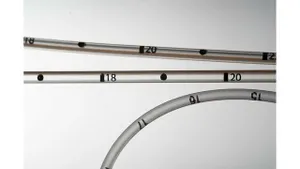Styron eyeing expansion of compounding in China, and acquisitions too
Executives at the world's leading supplier of polystyrene said they are keen to support their Asian business, already strong, with new compounding capacity, most likely in China. Without revealing specifics, Styron president and CEO Chris Pappas also said he is actively eyeing potential acquisitions in the region.
May 23, 2011
The Styron executives spoke during the Chinaplas trade show, held May 17-20 in Guangzhou. Styron was acquired last year by Bain Capital from Dow Chemical; its plastics portfolio includes polystyrene (PS) - both general purpose and high impact (HIPS), plus expandable PS, copolymers ABS and SAN, and compounds based on polycarbonate (PC), PS and polypropylene (this last only for the automotive industry). It produces styrene-based plastics (PS, EPS, ABS and SAN) at two manufacturing facilities in China and one each in the U.S., Brazil, Indonesia, Belgium, Germany and The Netherlands. It has a PC plant in Germany, and compounding sites in Taiwan and The Netherlands. Back-integration to styrene monomer is via a facility in Germany. The company has annual sales of about $5 billion of which 60% are from its plastics division.
During Chinaplas, Pappas said that 61% of his company's sales are realized in Europe, with the remained split between the Americas (22%) and Asia (17%), but that its business in Asia, especially China, is where the company now is seeing its greatest growth. "Our growth agenda is quite focused on Asia/Pacific," he said. The company's materials are specified for use in packaging, appliances and electronic devices, automotive parts, consumer goods and B&C. "In Asia our polystyrene business is mostly a HIPS business, with grades available to compete with engineering thermoplastics and especially ABS," explained Pappas.
ABS sees extensive use in appliances and white goods, automotive and E/E products, among other applications, and these are all areas the supplier says it can serve with its HIPS portfolio, with grades developed to target very specific end-use applications. . Paul Moyer, VP and GM of the supplier's plastics business, spoke of some materials now being introduced to the Asian market, including a HIPS grade, A-Tech 1180, designed to replace ABS in air conditioning housings. Two other grades, both in the XQ family of materials, are aimed at replacing ABS in small appliances.
Other materials introduced at Chinaplas to the Asia/Pacific region by the supplier include its Emerge 7800 and 7880 PC/ABS series in which 40-50% of the polycarbonate is post-consumer recycled. Asked by PlasticsToday where the PCR material is sourced, he said the supplier would not be identified but that neutral testing parties had certified the material's source and quality. These compounds are targeted at consumer electronics applications to help brand owners meet sustainability goals.
Packaging shift to PS? Not so fast
Plastics processors of PET and polypropylene have been faced with shortages (PET) and rapid price increases (PP) in the course of the past 12 months. With that in mind, we asked Moyer if he is seeing any movement away from those two materials to polystyrene for application such as deli packaging, where PET has eaten into PS's market share, and dairy application such as yogurt cups, which saw a prominent shift to PP from PS over the last 10 years.
Meyer acknowledged that interest in PS for these and other packaging applications again is on the rise, but that any shift from will take time. "The opportunity is there; we're starting to see it (some shift), but it does take some time." Looking ahead, he added, "If the PET shortage continues, especially, we could see some movement back to PS" from that material.
About the Author(s)
You May Also Like


